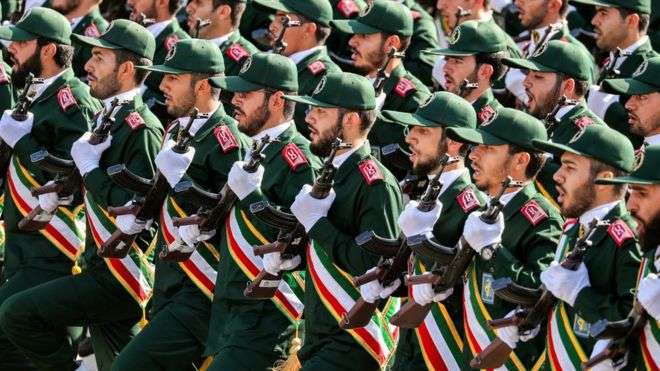The U.S. State Department has highlighted the ruling regime in Iran involvement, since it took power, in more than 360 international terrorist operations, including assassinations, bombings, and attacks in more than 40 countries.
The ministry documented in its report, published on Friday, those operations within the "global campaign of terrorism" carried out by the regime and included up to 360 targeted assassinations in other countries, as well as mass bombings that killed and wounded hundreds.
According to the published fact sheet, the United States believes that these assassinations were carried out primarily by the Revolutionary Guards and Jerusalem Intelligence Force, but also through third parties and agents such as the Lebanese Hezbollah militia.
[caption id="attachment_65127" align="aligncenter" width="660"] Iran's Revolutionary Guard[/caption]
Iran's Revolutionary Guard[/caption]
The U.S. State Department confirmed that Tehran is using diplomatic cover and is using criminal and drug gangs to carry out covert operations abroad.
Washington also clarified that political opponents, leaders and activists of ethnic and religious minorities and foreign government officials, as well as civil society activists and journalists abroad, are among the regime's targets.
The most famous operations were the assassination of the leader of the Iranian Kurdish opposition, Sadiq Sharafkandi, and three others in the "Mykonos" restaurant in Berlin in 1992, and the bombing of the Jewish "AMIA" building in Buenos Aires in 1994, which are the most famous historical cases of Tehran operations abroad.
Iran's Former Intelligence Minister
On May 20, the United States ranked Iran's former Intelligence Minister, Ali Fallahian, on the sanctions list, for his involvement in serious human rights violations during his tenure, including his role in the assassination of several political opponents in Europe, including the lawsuits opened in Swiss and German courts which issued orders to arrest him.
[caption id="attachment_128440" align="aligncenter" width="1024"] Iran's former Intelligence Minister, Ali Fallahian[/caption]
Iran's former Intelligence Minister, Ali Fallahian[/caption]
Fallahian is also accused of being behind the AMIA attack, being involved in the assassination of an American citizen in Gaza, and other assassinations against opponents.
Several countries have issued arrest warrants for Iranian diplomats on charges of killing opponents, including Mohsen Rabbani, the alleged mastermind of the AMIA bombing in Argentina, and the cultural attaché at the embassy in Buenos Aires, as well as Ahmed Reza Asgari, a member of the Revolutionary Guards who used the position of a third secretary in his country's embassy as cover.
Since 2018, Asadullah Asadi, who was appointed as a diplomat in Austria, remains in detention in Belgium awaiting trial on the basis of evidence that he provided explosives to target an Iranian opposition march in Paris that could have killed dozens of men, women and children.
Iran Threatens Journalists in Exile
According to the State Department report four U.N. special rapporteurs called on the Iranian government in last March to stop death threats against journalists working outside Iran, especially those working in Persian-speaking channels.
The assassination of Masoud Mawlawi in Istanbul in November 2019 is the latest attack by the Iranian regime.
The controversial blogger of the "Black Box" website that published allegations of corruption within the military elite, as well as the son of Khamenei, Mujtaba, was killed.
According to Reuters quoted senior Turkish officials reported by Reuters in March, two intelligence officers stationed at the Iranian consulate in Turkey incited the killing.
“The Iranian regime is weak, vulnerable and should be targeted,” according to a security and military analysis by a group of military and intelligence experts in Washington, on the sidelines of Secretary of State Mike Pompeo’s visit to Israel on Thursday, according to a report published by al-Hurra website.
When the United States killed the commander of the “Quds Force” in the Iranian Revolutionary Guard, General Qassem Soleimani, on January 3, President Donald Trump was quick to confirm that his administration was not seeking to change the Iranian regime, but according to experts in Washington, the torrent of economic sanctions imposed on Tehran, as well as the effects of the novel coronavirus are indicating quite the opposite.












